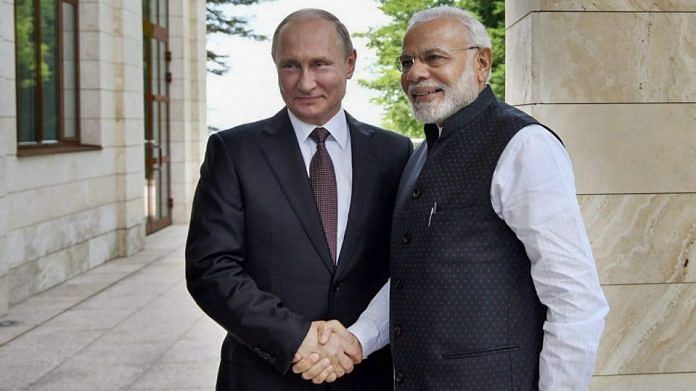On 28 April, Prime Minister Narendra Modi announced that he and Russian President Vladimir Putin had agreed to set a two-plus-two meeting between the two countries’ foreign and defence ministers. Russia will be the first country that is not part of the Quadrilateral Security Dialogue, also known as Quad, to have a 2-plus-2 meeting with India.
This sends a big and clear message to the international community that India’s foreign policy will not be constrained by ideology, bloc politics, or even external pressure. Rather, India’s decisions on how to engage with other countries will be heavily shaped by the importance of strategic autonomy and the preservation of its national interest. Moreover, it will be beneficial for other Quad members (particularly the US) and Russia to have India as a common denominator between them.
In April, Modi had tweeted that: “had an excellent conversation with my friend President Putin today. We discussed the evolving Covid-19 situation, and I thanked President Putin for Russia’s help and support in India’s fight against the pandemic.” Furthermore, he also announced that they had decided to establish a two-plus-two “to add further momentum to our strong strategic partnership.”
On 5 April, Russian Foreign Minister Sergey Lavrov undertook a two-day trip to India, where he met with his Indian counterpart, Minister of External Affairs S. Jaishankar. During the two foreign ministers’ joint press conference, they emphasised the “time-tested” and “remarkable resilience” of their bilateral partnership. However, the meeting seemed to have lacked a significant spark due to the shifting global geopolitical landscape.
Also read: Biden can’t see Indo-Pacific and pandemic with two prisms. Covid is the new reality
The Quad angle
India and the United States have significantly accelerated their ties. The US is fast becoming India’s leading partner in the realm of security due to China’s assertive rise, coupled with its unilateral and coercive actions throughout the Indo-Pacific. However, both countries continue to have diverging views on issues concerning Afghanistan (and the Taliban), Iran, Russia, and Pakistan. This closeness has been commonly debated to be a starting point for a more formal security partnership. In fact, the Quad has often been mistakenly believed to have the makings of becoming an ‘Asian NATO’.
It may be true that shared democratic ideologies matter in forging closer cooperation among countries, such as the Quad. However, the root cause of its enhancement has been centred on shared concern of balancing the threat of China in the region. The Quad will unlikely become a formal military alliance primarily due to each member’s highly complex and diverse relationship pattern with China. Moreover, India’s adherence to its strategic autonomy and its interest to maintain a robust partnership with Russia serve as major obstacles for such an endeavour to materialise.
Russia and India share a wide array of factors in the scope of their strategic partnership. These include nuclear, space, defence, energy, economic opportunities in the Russian Far East, the International North-South Transport Corridor (INSTC), the recently established Chennai-Vladivostok Maritime Corridor, and the manufacturing of the Russian vaccine Sputnik V in India.
Also read: Why seeing Russia and China as the new axis of evil is a non-starter
India, the common denominator
The latest announcement of an India-Russia two-plus-two dialogue demonstrates that India will not forgo its partnership with Russia for the Quad. However, it is also true that India will not compromise its role in the Quad for Russia’s satisfaction either. India is confident in its engagement with both parties considering that it is aware that its involvement in the Quad is not directed towards Russia, and its partnership with Russia is not directed towards the Quad.
Both Russia and the Quad are important cornerstones in India’s foreign policy. In fact, it may serve the interests of the three Quad members and Russia to have India as the common denominator between them for three important reasons.
First, it is in the best interest of the Quad, particularly, the US, to have Russia engage with a like-minded partner such as India rather than falling deeper into China’s embrace. Second, India’s presence in the Quad can be considered as a reassurance for Russia that the group will not turn into another NATO. Third, both the US and Russia will benefit from their partnership with India vis-à-vis China’s increasing dominance not only in the Indo-Pacific but also in Central Asia.
Thus, India’s foreign policy is crafted based on its strategic interests. As a result, it will be inevitable for the South Asian giant to engage freely with diverse powers in the international system.
Don McLain Gill is a resident fellow at the International Development and Security Cooperation (IDSC) and an international affairs author and analyst based in the Philippines. He is currently completing his master’s in international studies at the University of the Philippines Diliman. Views are personal.



